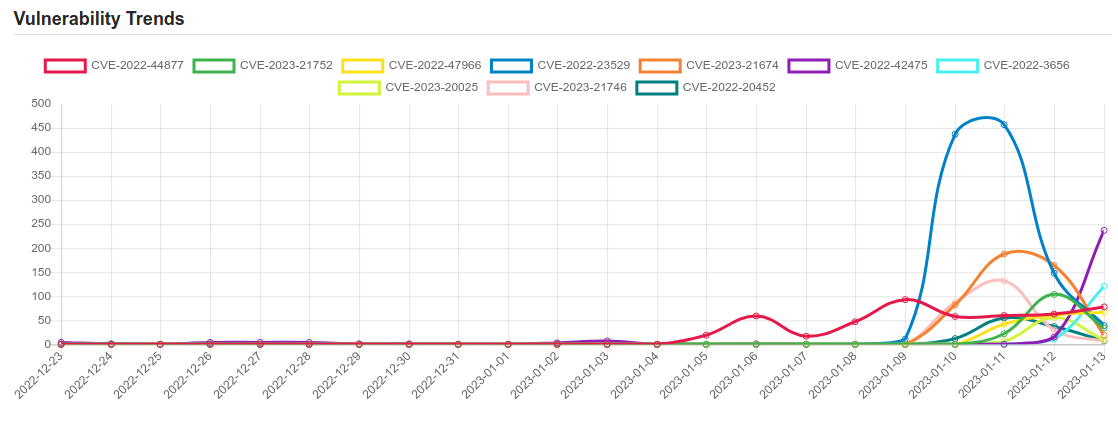Daily Vulnerability Trends: Sat Jan 14 2023

| CVE NAME | CVE Description |
| CVE-2022-20452 | In initializeFromParcelLocked of BaseBundle.java, there is a possible method arbitrary code execution due to a confused deputy. This could lead to local escalation of privilege with no additional execution privileges needed. User interaction is not needed for exploitation.Product: AndroidVersions: Android-13Android ID: A-240138318 |
| CVE-2019-10540 | Buffer overflow in WLAN NAN function due to lack of check of count value received in NAN availability attribute in Snapdragon Auto, Snapdragon Compute, Snapdragon Connectivity, Snapdragon Consumer Electronics Connectivity, Snapdragon Consumer IOT, Snapdragon Industrial IOT, Snapdragon Mobile, Snapdragon Voice & Music, Snapdragon Wired Infrastructure and Networking in IPQ8074, MSM8996AU, QCA6174A, QCA6574AU, QCA8081, QCA9377, QCA9379, QCS404, QCS405, QCS605, SD 636, SD 665, SD 675, SD 712 / SD 710 / SD 670, SD 730, SD 820, SD 835, SD 845 / SD 850, SD 855, SD 8CX, SDA660, SDM630, SDM660, SXR1130 |
| CVE-2022-41080 | Microsoft Exchange Server Elevation of Privilege Vulnerability. This CVE ID is unique from CVE-2022-41123. |
| CVE-2022-38627 | Nortek Linear eMerge E3-Series 0.32-08f, 0.32-07p, 0.32-07e, 0.32-09c, 0.32-09b, 0.32-09a, and 0.32-08e were discovered to contain a SQL injection vulnerability via the idt parameter. |
| CVE-2015-2291 | (1) IQVW32.sys before 1.3.1.0 and (2) IQVW64.sys before 1.3.1.0 in the Intel Ethernet diagnostics driver for Windows allows local users to cause a denial of service or possibly execute arbitrary code with kernel privileges via a crafted (a) 0x80862013, (b) 0x8086200B, (c) 0x8086200F, or (d) 0x80862007 IOCTL call. |
| CVE-2020-28362 | Go before 1.14.12 and 1.15.x before 1.15.4 allows Denial of Service. |
| CVE-2023-20026 | No description provided |
| CVE-2022-38773 | Affected devices do not contain an Immutable Root of Trust in Hardware. With this the integrity of the code executed on the device can not be validated during load-time. An attacker with physical access to the device could use this to replace the boot image of the device and execute arbitrary code. |
| CVE-2020-6418 | Type confusion in V8 in Google Chrome prior to 80.0.3987.122 allowed a remote attacker to potentially exploit heap corruption via a crafted HTML page. |
| CVE-2022-27510 | Unauthorized access to Gateway user capabilities |
| CVE-2022-41082 | Microsoft Exchange Server Remote Code Execution Vulnerability. |
| CVE-2023-21752 | Windows Backup Service Elevation of Privilege Vulnerability. |
| CVE-2022-47966 | No description provided |
| CVE-2022-23529 | node-jsonwebtoken is a JsonWebToken implementation for node.js. For versions `<= 8.5.1` of `jsonwebtoken` library, if a malicious actor has the ability to modify the key retrieval parameter (referring to the `secretOrPublicKey` argument from the readme link of the `jwt.verify()` function, they can write arbitrary files on the host machine. Users are affected only if untrusted entities are allowed to modify the key retrieval parameter of the `jwt.verify()` on a host that you control. This issue has been fixed, please update to version 9.0.0. |
| CVE-2022-42475 | A heap-based buffer overflow vulnerability [CWE-122] in FortiOS SSL-VPN 7.2.0 through 7.2.2, 7.0.0 through 7.0.8, 6.4.0 through 6.4.10, 6.2.0 through 6.2.11, 6.0.15 and earlier and FortiProxy SSL-VPN 7.2.0 through 7.2.1, 7.0.7 and earlier may allow a remote unauthenticated attacker to execute arbitrary code or commands via specifically crafted requests. |
|
A considerable amount of time and effort goes into maintaining this website, creating backend automation and creating new features and content for you to make actionable intelligence decisions. Everyone that supports the site helps enable new functionality.  To keep up to date follow us on the below channels.     
|

![[QILIN] - Ransomware Victim: Mainetti 7 image](https://www.redpacketsecurity.com/wp-content/uploads/2024/09/image-300x300.png)
